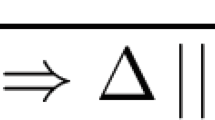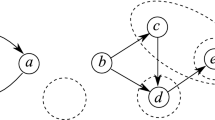Abstract
Up to now, all existing completeness results for ordered paramodulation and Knuth–Bendix completion have required term ordering ≻ to be well founded, monotonic, and total(izable) on ground terms. For several applications, these requirements are too strong, and hence weakening them has been a well-known research challenge.
Here we introduce a new completeness proof technique for ordered paramodulation where the only properties required on ≻ are well-foundedness and the subterm property. The technique is a relatively simple and elegant application of some fundamental results on the termination and confluence of ground term rewrite systems (TRS).
By a careful further analysis of our technique, we obtain the first Knuth–Bendix completion procedure that finds a convergent TRS for a given set of equations E and a (possibly non-totalizable) reduction ordering ≻ whenever it exists. Note that being a reduction ordering is the minimal possible requirement on ≻, since a TRS terminates if, and only if, it is contained in a reduction ordering.
Similar content being viewed by others
References
Bachmair, L. and Dershowitz, N.: Equational inference, canonical proofs, and proof orderings, J. Assoc. Comput. Mach. 41(2) (1994), 236-276.
Bachmair, L., Dershowitz, N. and Hsiang, J.: Orderings for equational proofs, in First IEEE Symposium on Logic in Computer Science (LICS), Cambridge, Massachusetts, USA, IEEE Computer Society Press, 1986, pp. 346-357.
Bachmair, L. and Ganzinger, H.: Rewrite-based equational theorem proving with selection and simplification, J. Logic Comput. 4(3) (1994), 217-247.
Bachmair, L. and Ganzinger, H.: Equational reasoning in saturation-based theorem proving, in W. Bibel and P. Schmitt (eds), Automated Deduction: A Basis for Applications, Kluwer Academic Publishers, Dordrecht, 1998.
Bachmair, L., Ganzinger, H., Lynch, C. and Snyder, W.: Basic paramodulation, Inform. and Comput. 121(2) (1995), 172-192.
Basin, D. and Ganzinger, H.: Complexity analysis based on ordered resolution, in Eleventh Annual IEEE Symposium on Logic in Computer Science (LICS), New Brunswick, New Jersey, USA, IEEE Computer Society Press, 1996, pp. 456-465.
Bofill, M. and Godoy, G.: On the completeness of arbitrary selection strategies for paramodulation, in Automata, Languages and Programming, 28th Int. Colloquium (ICALP), Crete, Greece, Springer-Verlag, New York, 2001.
Comon, H. and Nieuwenhuis, R.: Induction = I-axiomatization + first-order consistency, Inform. and Comput. 159(1/2) (2000), 151-186.
Dershowitz, N.: Orderings for term-rewriting systems, Theoret. Comput. Sci. 17(3) (1982), 279-301.
Dershowitz, N. and Jouannaud, J.-P.: Rewrite systems, in J. van Leeuwen (ed.), Handbook of Theoretical Computer Science, Vol. B: Formal Models and Semantics, Elsevier Science Publishers B.V., Amsterdam, Chapt. 6, pp. 244-320.
Dershowitz, N. and Manna, Z.: Proving termination with multiset orderings, Comm. ACM 22(8) (1979), 465-476.
Dershowitz, N., Marcus, L. and Tarlecki, A.: Existence, uniqueness, and construction of rewrite systems, SIAM J. Comput. 17(4) (1988), 629-639.
Devie, H.: Linear completion, in S. Kaplan and M. Okada (eds), Conditional and Typed Rewriting Systems, 2nd International Workshop, Montreal, Canada, Springer-Verlag, New York, 1990, pp. 233-245.
Devie, H.: Ph.D. thesis, Université de Paris-Sud, Orsay, France, 1992.
Hillenbrand, T., Buch, A., Vogt, R. and Löchner, B.: WALDMEISTER - High-performance equational deduction, J. Automated Reasoning 18(2) (1997), 265-270.
Hsiang, J. and Rusinowitch, M.: Proving refutational completeness of theorem proving strategies: The transfinite semantic tree method, J. ACM 38(3) (1991), 559-587.
Kamin, S. and Levy, J.-J.: Two generalizations of the recursive path ordering, Unpublished note, Dept. of Computer Science, Univ. of Illinois, Urbana, IL, 1980.
Kirchner, C., Kirchner, H. and Rusinowitch, M.: Deduction with symbolic constraints, Rev. Française d’Intelligence Artificielle 4(3) (1990), 9-52.
Lynch, C.: Oriented equational logic programming is complete, J. Symbolic Comput. 23(1) (1997), 23-46.
Marché, C.: On ground AC-completion, in R. V. Book (ed.), 4th Int. Conf. Rewriting Techniques and Applications (RTA), Como, Italy, Springer-Verlag, New York, 1991, pp. 411-422.
Narendran, P. and Rusinowitch, M.: Any ground associative commutative theory has a finite canonical system, in 4th Int. Conf. Rewriting Techniques and Applications (RTA), Como, Italy, Springer-Verlag, New York, 1991, pp. 423-434.
Narendran, P. and Rusinowitch, M.: The unifiability problem in ground AC theories, in Eighth Annual IEEE Symposium on Logic in Computer Science, Montreal, Canada, IEEE Computer Society Press, 1993, pp. 364-370.
Nieuwenhuis, R.: Decidability and complexity analysis by basic paramodulation, Inform. and Comput. 147 (1998), 1-21.
Nieuwenhuis, R. and Rubio, A.: Theorem proving with ordering and equality constrained clauses, J. Symbolic Comput. 19(4) (1995), 321-351.
Nieuwenhuis, R. and Rubio, A.: Paramodulation-based theorem proving, in J. Robinson and A. Voronkov (eds), Handbook of Automated Reasoning, Elsevier Science Publishers and MIT Press, 2001.
RTA-LOOP: Int. Conf. on Rewriting Techniques and Applications, The List of Open Problems, Maintained at http://www.lri.fr/∼rtaloop/ (by R. Treinen), 2001.
Rubio, A. and Nieuwenhuis, R.: A total AC-compatible ordering based on RPO, Theoret. Comput. Sci. 142(2) (1995), 209-227.
Wechler, W.: Universal Algebra for Computer Scientists, EATCS Monogr. Theoret. Comput. Sci. 25, Springer-Verlag, Berlin, 1991.
Weidenbach, C.: SPASS - Version 0.49, J. Automated Reasoning 18(2) (1997), 247-252.
Author information
Authors and Affiliations
Rights and permissions
About this article
Cite this article
Bofill, M., Godoy, G., Nieuwenhuis, R. et al. Paramodulation and Knuth–Bendix Completion with Nontotal and Nonmonotonic Orderings. Journal of Automated Reasoning 30, 99–120 (2003). https://doi.org/10.1023/A:1022515030222
Issue Date:
DOI: https://doi.org/10.1023/A:1022515030222




